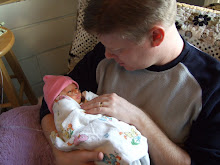The 2nd CPM element observed in every case study was that the Good News of Jesus was carelessly and broadly shared. Jesus illustrates this for us in the parable of the sower. I put the text of that parable at the bottom of this post if you need a refresher. In my opinion, this parable has more to tell us about spreading the Gospel than any other.
The first thing we see in the parable is a bit counter intuitive. The farmer is spreading seed carelessly - he is spreading it on a path, in thorn bushes, in rocky soil, and in good soil. Why would any farmer do that? A farmer would know not to waste good seed by throwing it on a path! The only reason he might do it is if he was blind and couldn't tell the difference between the path, the thorns, the shallow soil, and the good soil. And this is the point! Jesus is telling us that we need to spread the Gospel carelessly because we aren't able to discern which people are the path, which are the thorns, which are the rocky soil, and which are good soil.
We generally have a hard time with this principle. We tend to pick out a handful of people we think will be good soil and then we invest in them. When they do not grow, we get frustrated and feel like we failed. Notice that in this story the effectiveness of the seed was not based on the farmer, it was based on the soil. In too many cases, we have simply chosen people who aren't ready to grow, and then seen no results. What would happen if we broadened our sample size from 2 people to 20, and then chose the people to invest in by what we saw happening in their lives? We need to remember that it is not our great planting that makes the plants grow. It is God and the condition of the soil. CPM comes from sharing the story of Jesus broadly, with everyone - not just those who we think might be 'good soil'.
The second thing the parable shows us is that in good soil the seed greatly multiplies itself. In fact, it is natural result for the good soil, and it should be expected. Similarly, it should be the natural result of the Gospel as well. We will get to this more in a later principle. For now, I just want to say that multiplication should be the norm, not the exception.
We must carelessly and broadly share the Gospel and then invest our time in the people who are multiplying. This is the 2nd principle.
Matthew 13:3-9; 18-23
3Then he told them many things in parables, saying: "A farmer went out to sow his seed. 4As he was scattering the seed, some fell along the path, and the birds came and ate it up. 5Some fell on rocky places, where it did not have much soil. It sprang up quickly, because the soil was shallow. 6But when the sun came up, the plants were scorched, and they withered because they had no root. 7Other seed fell among thorns, which grew up and choked the plants. 8Still other seed fell on good soil, where it produced a crop—a hundred, sixty or thirty times what was sown. 9He who has ears, let him hear."
18"Listen then to what the parable of the sower means: 19When anyone hears the message about the kingdom and does not understand it, the evil one comes and snatches away what was sown in his heart. This is the seed sown along the path. 20The one who received the seed that fell on rocky places is the man who hears the word and at once receives it with joy. 21But since he has no root, he lasts only a short time. When trouble or persecution comes because of the word, he quickly falls away. 22The one who received the seed that fell among the thorns is the man who hears the word, but the worries of this life and the deceitfulness of wealth choke it, making it unfruitful. 23But the one who received the seed that fell on good soil is the man who hears the word and understands it. He produces a crop, yielding a hundred, sixty or thirty times what was sown."
Friday, April 17, 2009
Subscribe to:
Post Comments (Atom)





No comments:
Post a Comment